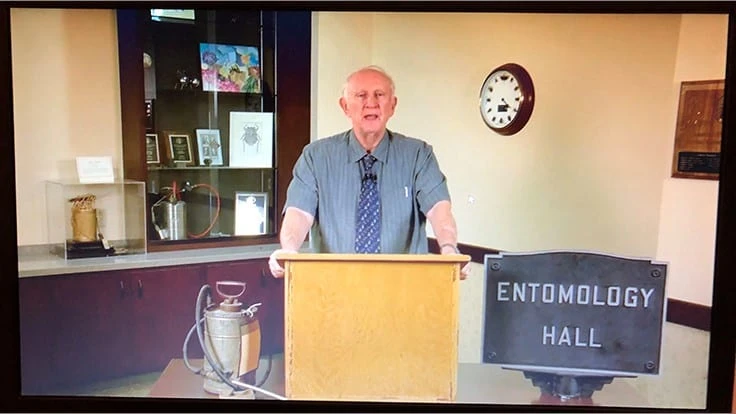
WEST LAFAYETTE, Ind. – With the world in the midst of adapting to changes brought about by COVID-19, it was appropriate that recently retired Purdue Entomology Professor Dr. Gary Bennett – a man who has witnessed the pest control change and adapt throughout his 50-plus year career – kicked off this year’s event, which is being held virtually this week.
Bennett discussed the importance of technicians and technology as relates to pest management. “Technology really is industry science. In other words, it's about protecting the public and it's about performing pest management in the appropriate way.”
Bennet said one of the goals of the Purdue conference is to help service professionals better understand the science behind pest management and help get them certified so that they evolve from technicians to pest management specialists, whom he says “represent a little higher level of technician in terms of the person who has become certified and the person who has met the qualifications that are needing needed to do a really good job.”
Bennett noted that the best management professionals are called on to protect the general public, from both a health and welfare perspective. This includes managing public health pests (e.g., rodents and cockroaches), protecting property from wood-destroying insects and helping to protect the nation’s food supply.
In terms of training, Bennett said having a thorough understanding of pest biology and behavior remains the foundation, but pest management professionals also need to stay up-to-date on trends and developments, such as insects’ abilities to develop resistance to pesticides.
“Physiologically, [insects] develop in such a way genetically, they change so that those insects that are most resistant to any kind of a chemical that you use survive that treatment and then they reproduce and their young are even more resistant than the previous generation,” Bennet said. “So you have to be knowledgeable about physiology and even genetics because it is a genetic process that these pests go through to survive anything that you might do from a pest management strategy.”
When it comes to insect biology, Bennett cited longtime Purdue speaker Dr. Austin Frishman as a great example of an educator skilled at relating how insects behave, how they what they feed, where they hide, etc. “He is a great educator in terms of teaching his students to think like the pest that they're trying to manage,” Bennett said.
Bennett brought with him for his presentation the original B&G compressed air sprayer, which was designed and constructed at Purdue. Compressed air sprayers have been a mainstay in PMPs’ arsenals for years. He noted that good pest management uses tools like compressed air sprayers, stick traps, baits etc., as well as non-chemical methods such as exclusion and improving sanitation practices.
Bennett said the pest control industry has come a long way in terms of more judiciously using pesticides and improving its image. Pest management professionals continue to play a critical role in this evolution, Bennett said. “Technicians need to use all the tools that are in the toolbox. They need to develop programs that meet the customers' needs and the customers' desires. And at the same time, they need to be environmentally responsible, as well as taking care of the pest problem in the safest, most environmentally sensitive way,” he said. “So keep that in mind. Technology and pest control technicians, or pest management specialists, are really the important people in your company. So make sure that they get the kind of training that they need to develop the programs for your customers that you would like to see."
Latest from Pest Control Technology
- Donny Oswalt Shares What Makes Termites a 'Tricky' Pest
- Study Finds Fecal Tests Can Reveal Active Termite Infestations
- Peachtree Pest Control Partners with Local Nonprofits to Fight Food Insecurity
- Allergy Technologies, PHA Expand ATAHC Complete Program to Protect 8,500 Homes
- Housecall Pro Hosts '25 Winter Summit Featuring Mike Rowe
- Advanced Education
- Spotted Lanternflies, BMSBs Most Problematic Invasive Pests, Poll Finds
- Ecolab Acquires Guardian Pest Solutions





